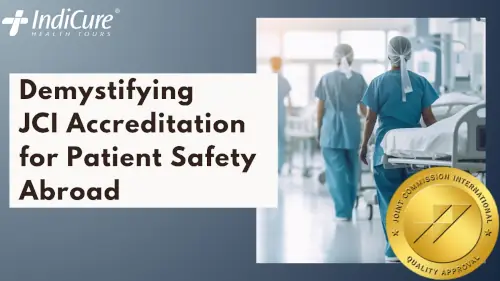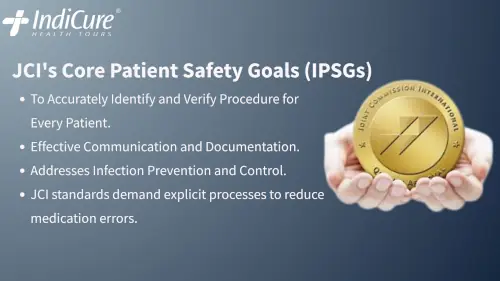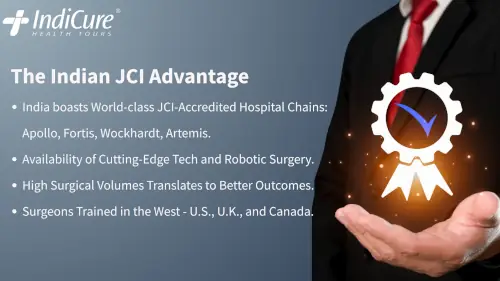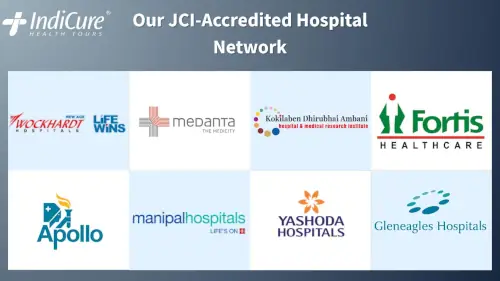Demystifying JCI Accreditation: What the 'Gold Seal' Means for Patient Safety Abroad

Healthcare Abroad: A New Path to Affordable Healthcare
The rising healthcare costs in countries like the United States, Canada, Australia, and New Zealand have made essential, life-changing surgeries unaffordable for millions.
For many middle-aged and older adults, necessary procedures such as total knee replacements (TKR) or Coronary Artery Bypass Grafting (CABG) are delayed or forgotten entirely due to high deductibles, limited insurance coverage, or unreasonably high out-of-pocket expenses. This financial crisis forces difficult decisions. Traveling thousands of miles for care, which should ideally be accessible locally, becomes not merely a choice of preference but a financial necessity.
This necessary medical travel carries an emotional burden as patients struggle to find world-class treatment without compromising on quality or safety.
Medical travel to global hubs like India has emerged as a financially imperative path forward, one that promises substantial savings without requiring a compromise on clinical excellence.
However, when considering medical treatment abroad, the primary anxiety revolves around unfamiliarity: How can one guarantee clinical safety? Are the hygiene standards comparable to facilities back home? Are the surgeons truly qualified? What happens if post-operative complications arise? These are valid and serious concerns that must be addressed definitively.
The definitive answer lies in accreditation by Joint Commission International (JCI). JCI accreditation is recognized globally as the undisputed "Gold Seal" that systematically addresses every major safety and quality concern associated with international care. It serves as the single most rigorous metric for determining medical tourism safety standards.
This comprehensive blog is designed to demystify JCI accreditation, illustrating its demanding standards and demonstrating precisely how the sophisticated network of JCI accredited hospitals in India, when coupled with the seamless, end-to-end logistical and ethical support provided by IndiCure Health Tours, transforms a potentially risky venture into a secure, accessible, and high-quality healthcare journey. By addressing the patient's financial concerns, it becomes clear that choosing to travel for treatment—out of necessity and for cost savings—can be a safe option when done through accredited hospitals and trusted facilitators.
Decoding the Gold Seal: The Anatomy of JCI Accreditation
Joint Commission International (JCI) is the international arm of The Joint Commission (the U.S. healthcare standard-setting body), formerly known as JCAHO or Joint Commission on Accreditation of Healthcare Organizations. The name itself links its accreditation to trusted Western quality management benchmarks and provides instant credibility to international patients.
External Validation and Unparalleled Rigor
JCI's standards are the pinnacle of global peer review, validated by the International Society for Quality in Health Care (ISQua)—the "accreditor of accreditors."
Standard Development: Standards are developed through meticulous, scientific collaboration with global health professionals and governmental agencies, including the Centers for Medicare & Medicaid Services (CMS). This alignment ensures the clinical framework is robust and implicitly harmonized with regulated Western health systems.
Measurability: New standards must clearly relate to patient safety, improve outcomes, and be accurately and easily measurable. This calls for objective assessment, moving the standard of care far beyond subjective self-assessment.

Beyond Infrastructure: JCI Assesses the Organizational Culture
JCI accreditation is not just an inspection of equipment; it requires a comprehensive, objective, on-site survey by expert surveyors to confirm high standards are met in daily practice.
Non-Punitive Culture of Safety (APR.9): This critical standard mandates a non-punitive culture, allowing all staff (clinical or administrative) to report patient safety concerns directly to JCI without fear of retaliation.
Trust Building: This mandate protects against systemic failures and cultural cover-ups, demonstrating that JCI-accredited hospitals prioritize patient safety above organizational defensiveness, which is foundational to building trust with international patients.
JCI's Core Patient Safety Goals (IPSGs)
Joint Commission's International Patient Safety Goals (IPSGs) establish the following essential, verifiable standards to mitigate critical risks amplified in medical tourism.
-
Accurate Identification and Procedure Verification (Goal 1: IPSG.1)
This minimizes serious, preventable errors (wrong-site, wrong-patient surgery).
- Requirement: Patients must be identified using two distinct criteria before any treatment or procedure. This is a non-negotiable defense for complex surgeries like TKR or CABG.
-
Effective Communication and Documentation (Goal 2: IPSG.2 & APR.10)
This addresses the risk of discontinuity and communication breakdown for medical tourists.
- Documentation (IPSG.2): Standardized, stringent procedures for reporting critical test results and detailed patient handovers ensure accurate records for transfer back to the home physician.
- Language (APR.10): Requires qualified, independent medical translation services to ensure patients fully understand consent and treatment plans, enabling genuinely informed decision-making.
-
Infection Prevention and Control (IPC) (Goal 3)
Addressing the paramount concern of Hospital-Acquired Infections (HAIs) and Antibiotic-Resistant Organisms (AROs).
- Key Measures: Mandates robust IPC programs, including high standards for hand hygiene, surgical site infection surveillance, and rigorous Antimicrobial Stewardship Programmes (AMSP).
- Assurance: The Gold Seal assures sophisticated measures are in place to counter infection risks and mitigate public health concerns upon the patient's return home.
-
Medication Safety (Goal 4)
JCI standards demand explicit processes to reduce medication errors.
- Focus: Emphasizes meticulous medication reconciliation upon patient admission and discharge.
- Value for Tourists: This is vital for medical tourists transitioning between local and home-country prescriptions, significantly reducing the risk of dosage errors or adverse drug interactions during the continuum of care.

The Indian Healthcare Advantage: JCI Accredited Hospitals
India's JCI-accredited hospitals offer a compelling advantage, purposefully developed to meet international patient standards. Below are the highlights worth mentioning -
Scale, Infrastructure, and Technological Sophistication
India boasts a formidable healthcare infrastructure with state-of-the-art technology, including robotic surgery platforms and advanced imaging, entirely comparable to top Western facilities.
The presence of major, multi-branch corporate chains (like Apollo, Fortis, and Wockhardt) with JCI accreditation signals institutional stability, reliable financial backing, and a scalable, enduring commitment to maintaining global standards for safe and reliable patient care.
Specialties and Surgical Volume
Expertise in these major multi-branch corporate facilities is concentrated in complex procedures sought by medical tourists. The high volume of surgeries directly translates into greater institutional expertise, ensuring clinical outcomes consistently match the world's best centers.
Key Specializations include:
- Cardiac Surgeries: CABG, valve replacements, complex pediatric cardiology.
- Orthopedic Surgeries: Hip/Knee Replacements, intricate spine surgery.
- Advanced Oncology: Comprehensive cancer care, including complex surgical oncology and bone marrow transplants.
- Other Procedures: Liver/kidney transplants, cosmetic surgery, and specialized dental treatments.
Surgeon Qualifications: Global Expertise, Local Value
Surgeons in JCI-accredited Indian hospitals are world-class. Many hold extensive international qualifications, having completed advanced training, residencies, or fellowships in highly regulated systems (U.S., U.K., Canada, Germany).
These specialists often meet training requirements similar to Western board certification bodies, involving rigorous multi-year residency, extensive operative experience, and passing stringent written and oral examinations. This combination of global training within an internationally accredited system provides the highest level of clinical assurance.

The Value Equation: Quality, Safety, and Savings
Why Quality Doesn't Require a Premium
A common misconception is that the immense cost savings offered by medical travel must equate to a sacrifice in quality or safety. This is demonstrably untrue. The savings, which often range between 70 to 90 percent compared to U.S. prices, are not achieved through inferior materials, care standards, or staffing levels, but rather through systemic economic factors.
The high cost of Western healthcare is often driven by complex regulatory compliance, exorbitant administrative overheads, minimal requirements for malpractice insurance, and a litigation-heavy environment. In contrast, India benefits from a lower cost of infrastructure and labor, reduced administrative complexity, and a significant currency advantage. The streamlined system in JCI accredited hospitals in India allows for remarkable affordability while strictly adhering to the highest medical tourism safety standards set by JCI.
Direct Comparative Analysis: Procedures and Price Points
The scale of savings is the foundational reason for medical tourism. Analyzing the costs for the most sought-after complex surgeries reaffirms the initial financial motivation and clearly demonstrates why travel is justified.
Comparative Cost Analysis for Major Procedures (USD, Estimated)
| Procedure | USA (Avg. Private/Uninsured) | Canada / Australia (Estimated) | JCI Accredited Hospitals India | Potential Savings |
|---|---|---|---|---|
| Total Knee Replacement (TKR) | $30,000 - $70,000 | $15,000 - $30,000 | $3,600 - $6,000 | Up to 90% |
| Coronary Artery Bypass Graft (CABG) | $40,000 - $60,000 | $20,000 - $35,000 | $4,500 - $7,000 | Up to 90% |
These immense savings are often enough to cover the surgery, airfare, accommodation, and the mandatory post-operative recovery stay, still leaving the patient significantly better off financially. This substantial economic advantage highlights the importance of not cutting corners on essential aspects of a safe medical journey, including using a comprehensive facilitator service and following the recommended recovery period.
The IndiCure Advantage: Seamless Care and Continuity
JCI accreditation establishes clinical safety within the hospital walls; however, for international patients, the journey involves complex logistics and operational risks even outside the clinical setting. IndiCure Health Tours acts as the essential logistical safety manager, providing the complete end-to-end support system required to connect the international patients safely to the clinical excellence of JCI accredited hospitals in India.
IndiCure's Patient Safety Commitment
IndiCure prioritizes patient safety through a rigorous vetting mandate that acts as the client's initial filter. This policy is strictly enforced: IndiCure partners exclusively with hospitals that hold Joint Commission International (JCI) accreditation or the equivalent National Accreditation Board for Hospitals & Healthcare Providers (NABH) accreditation. This ensures that clients are automatically directed only to facilities that meet the highest established medical tourism safety standards, removing the guesswork for patients. Leading examples of these high-standard partner hospitals include Apollo Hospitals, Fortis Healthcare, Medanta the Medicity, Yashodha Hospitals, Manipal Hospitals, Gleneagles Hospital, Kokilaben Dhirubhai Ambani Hospital, and Wockhardt Hospitals.

Pre-Travel Preparation: Eliminating Uncertainty
The process begins long before the patient boards the flight. IndiCure ensures that patients can genuinely achieve "informed decision-making" by arranging personalized video consultations with the treating surgeons at the JCI accredited hospitals in India. This allows the patient to establish a direct relationship with the specialist and ask critical questions.
Furthermore, IndiCure handles the complex documentation and visa logistics that often deter first-time medical travelers. This includes providing the official invitation letter from the hospital along with all necessary documents to support the medical visa application. As a complimentary service, IndiCure guides the patient through and even assists in filing the visa application, requiring the patient only to pay the visa fee. By managing these pre-travel details, IndiCure mitigates major sources of early stress and uncertainty.
The In-Country Safety Net
Upon arrival, IndiCure's comprehensive support framework ensures the patient's energy is reserved entirely for healing, not for navigating a foreign country. Logistical oversight includes handling airport transfers and securing appropriate, pre-vetted accommodation near the JCI facility, tailored to the patient's preferences and budget. IndiCure also works closely with the hospital's dedicated International Patient Services team, which is a requirement for partnership, to ensure smooth coordination and personalized support.
JCI manages clinical risk, while IndiCure manages the operational and emotional risk (travel stress, language barriers, visa hurdles). This synergy functions as a powerful buffer, maximizing the success potential offered by the clinically excellent JCI accredited hospitals in India.
Post-Operative Continuity: Bridging the Care Gap
The period immediately following surgery is critical. IndiCure strongly emphasizes the importance of the mandatory post-operative recovery period in India, as recommended by the surgeon (e.g., typically two to three weeks for major orthopedic procedures). This recovery stay ensures proper wound monitoring, necessary rehabilitation, and timely follow-up consultations before the patient is medically cleared for the return flight.
Finally, IndiCure remains available for post-operative consultations and ensures the seamless transfer of care back home. The team assists patients in compiling all required medical documentation, discharge summaries, and prescriptions necessary for a smooth transition back to their local physician. This crucial step directly mitigates the continuity-of-care risk identified by health experts, assuring the patient that their journey is monitored from consultation through complete recovery at home.
Conclusion: Confidence in Your Medical Journey
The decision to seek affordable, high-quality healthcare abroad is often a daunting one, born of financial necessity. However, this necessity does not require a trade-off in clinical standards. The JCI Gold Seal is far more than a marketing phrase; it is a complex, measurable standard rigorously applied and externally validated across the world's finest medical institutions. It represents a commitment to patient identification accuracy, clinical communication effectiveness, infection prevention, and a transparent culture of safety.
The network of JCI accredited hospitals in India represents a nexus of world-class expertise and infrastructure, offering superior clinical outcomes in high-demand procedures like CABG and TKR that come at a fraction of the cost as compared to Western nations. IndiCure Health Tours bridges the gap and helps remove the associated complexity and risks, connecting international patients only to this established network of accredited facilities and providing a crucial safety net encompassing every logistical, administrative, and post-operative requirement.
For those facing high healthcare costs, choosing a secure and affordable health journey with IndiCure and its JCI-accredited partners is not a compromise but a proven and safe choice grounded in established medical tourism safety standards.
Frequently Asked Questions (FAQ)
-
What does JCI accreditation actually mean for the patient's safety during surgery?
JCI accreditation mandates adherence to International Patient Safety Goals (IPSGs). For surgery, this includes stringent verification protocols (like using two patient identifiers) before any procedure to prevent wrong-site errors, and rigorous Infection Prevention and Control (IPC) standards to minimize the risk of hospital-acquired infections (HAIs), which is a key measure of safety.
-
Are the surgeons in JCI accredited hospitals in India board-certified or internationally trained?
Yes, absolutely. Most surgeons affiliated with JCI accredited hospitals in India hold extensive international experience, having completed residency, fellowship training, and board certification requirements in countries like the U.S., U.K., Canada, or Australia. Their training and operative experience are often verified against rigorous global standards.
-
How can India offer such low costs while maintaining JCI quality?
The immense cost difference (up to 90 percent savings) stems from systemic economic factors, including lower costs for infrastructure, reduced administrative overheads, and significant currency advantages. It does not reflect a lower quality of care, surgical materials, or clinical expertise within JCI-accredited facilities, rather it demonstrates how comparable standards can be achieved at far more affordable costs.
-
What if I need critical follow-up care or develop complications after returning home?
JCI standards emphasize documentation continuity. IndiCure ensures that all medical records, diagnostic results, and discharge summaries are meticulously compiled for the patient. This allows for seamless transfer of information to your local physician, mitigating the risk of discontinuity of care identified by safety experts. IndiCure also remains available for remote post-operative consultations.
-
What makes JCI the "Gold Seal"—are its standards verified by an external body?
Yes, JCI standards are considered the global benchmark because they have been externally validated by the International Society for Quality in Health Care (ISQua). ISQua is recognized as the "accreditor of accreditors," confirming that JCI fulfills international requirements for hospital quality assessment.
-
How does IndiCure ensure the hospital maintains the required medical tourism safety standards?
IndiCure maintains a strict vetting policy, partnering exclusively with hospitals that hold internationally recognized accreditations, primarily JCI or NABH. This mandatory requirement ensures that every partner facility meets high, externally verified standards for clinical quality and patient safety.
-
Is the quality of nursing and technical staff in JCI accredited hospitals India comparable to Western standards?
JCI accreditation standards apply across the entire organization, including staff competency. The standards require demonstrable adherence to protocols for clinical competence, hygiene, and patient communication, ensuring that the entire team supporting the surgeon meets international benchmarks.
-
Will there be language barriers during my treatment or consultations?
JCI accredited hospitals in India are required to implement processes to have effective communication. JCI mandates that qualified, independent professionals be used for translation and interpretation, particularly in clinical and consent settings, ensuring clear and accurate understanding for the patient. IndiCure also works closely with the hospital's dedicated International Patient Services team to ensure clear communication throughout the stay.
-
How does JCI ensure the continuity of my medical documentation when I travel back to my home country?
JCI's International Patient Safety Goals (IPSG.2) require the hospital to implement specific processes for "handover communication" and management of patient records. This standardization helps ensure your medical documentation and discharge summaries are accurate and complete, minimizing the risk of discontinuity of care when you transfer back to your local physician.
-
Does JCI accreditation only look at physical facilities and surgeons, or does it cover the hospital's internal culture?
JCI requires a comprehensive culture of safety. Specifically, JCI standard APR.9 mandates a non-punitive environment where any staff member can report concerns about patient safety and quality of care directly to JCI without fear of retaliation from the hospital. This ensures safety is a priority at all levels.